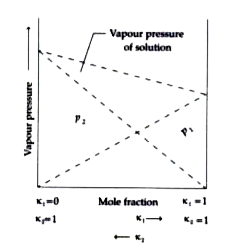For a dilute solution, Raoult's law states that
The lowering of vapour pressure is equal to mole fraction of solute
The relative lowering of vapour pressure is equal to mole fraction of solute
The relative lowering of vapour pressure is proportional to the amount of solute in solution.
The vapour pressure of the solution is equal to the mole fraction of solvent.
The correct Answer is:B
Step by step video, text & image solution for For a dilute solution, Raoult's law states that by Chemistry experts to help you in doubts & scoring excellent marks in Class 12 exams.
Updated on:21/07/2023Topper's Solved these Questions
Similar Questions
Knowledge Check
For a dilute solution, Raoult's low srates that :
Athe lowering of vapour pressure is equal to the mole fraction soluteBthe relative lowering of varpour pressure is equal to the mole fraction of soluteCthe relative lowering of varpour pressure is proportional to the amount of solute in solutionDthe vapour pressure of the solution is equal to the mole fraction of solventIn which of these solutions Raoult’s law is not applicable?
A1 M NaClB1 M ureaC1 M glucoseD1 M sucrose.Read the passage given below and answer the following questions :
Raoult's law states that for a solution of volatile liquids, the partial vapour pressure of each component of the solution is directly proportional to its mole fraction present in solution. Dalton's law of partial pressure states that the total pressure Ptotal over the solution phase in the container will be the sum of the partial pressures of the components of the solution and is given as:
Ptotal= P1+ P2

What type of deviation from Raoult's law does the above graph represent ?AFirst positive then negativeBNegative deviationCPositive deviationDFirst negative then positive
An ideal solution follows Raoult's law over all ranges of concentrations and pressure.
View SolutionOne component of a solution follows Raoult's over the entire range 0≤x1≤1. The second component must follow Raoult's law in the range when x2 is
View SolutionIf n2 moles of non-volatile solute are dissolved in n1 moles of the solvent, Raoult's law is expressed mathematically as
View SolutionWhat are the conditions for an ideal solution which obeys Raoult's law over the entire range of concentration ?
View SolutionA solution which obeys Raoult's law is
View Solution